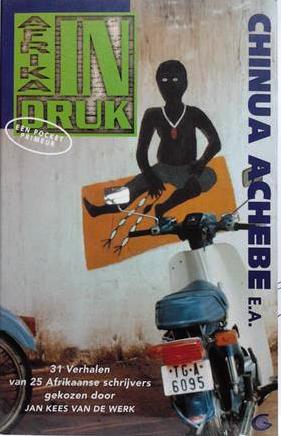



Search
Search our 7.958 News Items
CATEGORIES
We found 955 books in our category 'LITERATURE'
We found 7 news items
We found 955 books

Afrika indruk. Afrikaanse verhalen samengesteld en ingeleid door Jan Kees Van de Werk
Pocket, 317 pp., met bibliografie
ACHEBE Chinua, e.a.@ wikipedia
€ 15.0

Les désirs impudiques de Lady Béatrice.
Hardcover, jaquette, relié, 8vo, 201 pp.
Adaptation française de Paul BRAUCA@ wikipedia
€ 10.0

Gouda
G.B. Van Goor Zonen
1878
DEU 
condition: Good, cover licht beschadigd, roestvlekjes
book number: 39601
Licht en Donker in een Meisjesleven naar het Hoogduitsch van Clare Crom.
Hardcover, leder, goudopdruk op cover en rug, gebonden, 8vo,161 pp, geïllustreerd
AGATHA@ wikipedia
€ 30.0

Baarn
Ambo
1992
EGY
condition: As new/comme neuf/wie neu/als nieuw
book number: 19750117
Oorlog in het land Egypte (vertaling van Al-harb fi barr Misr - 1975)
Pb, in-8, 155 pp. Uit het Arabisch vertaald door Heleen Koesen. Dit boek, geschreven in 1975, werd in Egypte tot 1985 verboden en werd daarom eerst in Beiroet uitgegeven. Al-ka'ied (°al-Dahrieja 1944). Thema: Oktober-oorlog 1973 met Israël. Zoon van een lokale machthebber laat zich vervangen tijdens zijn legerdienst. De vader van de vervanger kan alzo zijn lapje grond behouden.
AL-KA'IED Joesef@ wikipedia
€ 15.0

Amsterdam
Arbeiderspers
1995
USA 
condition: Very good
book number: 18660009
Fatale liefdesjacht (vert. van A Long Fatal Love Chase - 1866)
Pb, in-8, 230 pp. Uit het Amerikaans vertaald door Tinke Davids. Het manuscript bleef ongepubliceerd tot 1995. Het werd in 1866 door de uitgever afgewezen als 'te vrijmoedig'. Alcott (1832-1888)
ALCOTT Louisa May@ wikipedia
€ 15.0

Amsterdam
Bert Bakker
1991
ESP
condition: Very good
book number: 19360067
Locos. Een gebarenkomedie.
Pb, in-8, 201 pp.
ALFAU Felipe@ wikipedia
€ 15.0

Spaanse Letterkunde.
Pocket, 526 pp, index
ALONSO HERNANDEZ J.L., HERMANS H.L.M., METZELIN M., OOSTENDORP H.T.@ wikipedia
€ 10.0

Berlin
Deutsche Buch-Gemeinschaft
1967
DEU 
condition: Very fine
book number: 33418
Novellen und Erzählungen
Hardcover, leinen, gebunden, 8vo, 418 pp.
ANDRES Stefan@ wikipedia
€ 10.0

Antwerpen
Continental Publishing
1998
BEL 
condition: Very good
book number: 38215
De Poolse Connectie.
Softcover, pb, 8vo, 127 pp.
ANDRIES Marc@ wikipedia
€ 10.0
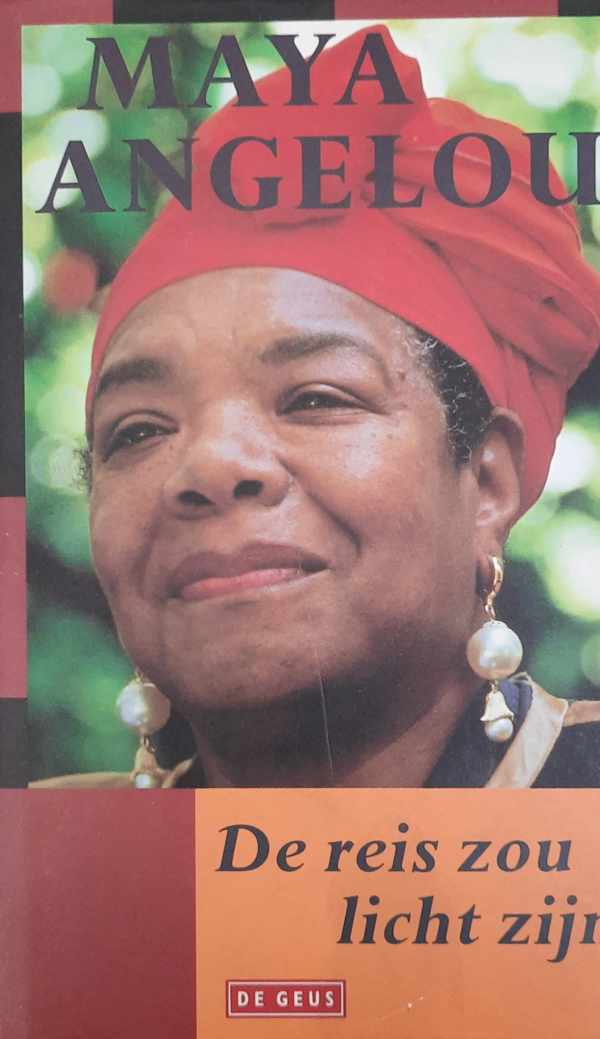
Breda
De Geus
1994
USA 
condition: Very good/Très bel état/Sehr gut/Zeer goed
book number: 202209191626
De reis zou licht zijn
Hardcover, stofwikkel, in-8, 126 pp., vertaald uit het Amerikaans.
Verzameling 'levensopvattingen' over diverse onderwerpen als de voordelen van een geplande zwangerschap en confrontaties met de dood.
Maya Angelou, eigenlijk Margueritte Johnson (Saint Louis, Missouri, 4 april 1928 – Winston-Salem, 28 mei 2014), was een Amerikaans schrijver, dichter, zangeres, danseres, burgerrechtenactivist en hoogleraar amerikanistiek.
Verzameling 'levensopvattingen' over diverse onderwerpen als de voordelen van een geplande zwangerschap en confrontaties met de dood.
Maya Angelou, eigenlijk Margueritte Johnson (Saint Louis, Missouri, 4 april 1928 – Winston-Salem, 28 mei 2014), was een Amerikaans schrijver, dichter, zangeres, danseres, burgerrechtenactivist en hoogleraar amerikanistiek.
ANGELOU Maya@ wikipedia
€ 10.0

Amsterdam
De bezige bij
1960
BEL 
condition: good, bon état
book number: 202403051627
Becket of de eer van God
Paperback, in-8, 171 pp.
ANOUILH Jean@ wikipedia
€ 7.5

Amsterdam
Thomas Rap
2017
SWE
condition: As new/comme neuf/wie neu/als nieuw.
book number: 202404201316
1947 - hier begint het heden (1947. Where now begins - 2017)
 Paperback, in-8, 272 pp., bibliografie.
Paperback, in-8, 272 pp., bibliografie. Zij die de oorlog verloren, de fascisten, zijn op de vlucht. Ze moeten weg, ver weg: naar Zuid-Amerika. In Polen wordt een half miljoen mensen wegens collaboratie aangeklaagd. Simone de Beauvoir vliegt naar New York, waar ze verliefd wordt op de schrijver Nelson Algren. De Engelsen, die al druk genoeg zijn met hun eigen puin, willen van Palestina af. Lord Mountbatten voert gesprekken met Nehru en Gandhi over de toekomst van India. Christian Dior presenteert in Parijs zijn eerste collectie. In Egypte begint de zoon van een klokkenmaker een nieuwe beweging: de moslimbroederschap. Duizenden, honderdduizenden vluchtelingen trekken door Europa, op zoek naar een nieuwe plek om te leven, op zoek naar een toekomst. In de haven van Marseille ligt een wit passagiersschip. De mensen aan boord willen naar een land dat nog niet bestaat. Ze willen naar Israël.
Zij die de oorlog verloren, de fascisten, zijn op de vlucht. Ze moeten weg, ver weg: naar Zuid-Amerika. In Polen wordt een half miljoen mensen wegens collaboratie aangeklaagd. Simone de Beauvoir vliegt naar New York, waar ze verliefd wordt op de schrijver Nelson Algren. De Engelsen, die al druk genoeg zijn met hun eigen puin, willen van Palestina af. Lord Mountbatten voert gesprekken met Nehru en Gandhi over de toekomst van India. Christian Dior presenteert in Parijs zijn eerste collectie. In Egypte begint de zoon van een klokkenmaker een nieuwe beweging: de moslimbroederschap. Duizenden, honderdduizenden vluchtelingen trekken door Europa, op zoek naar een nieuwe plek om te leven, op zoek naar een toekomst. In de haven van Marseille ligt een wit passagiersschip. De mensen aan boord willen naar een land dat nog niet bestaat. Ze willen naar Israël.Met de mooiste scherven die zij vond legt Elisabeth Åsbrink een indrukwekkend mozaïek en vormt ze een caleidoscopisch beeld van een jaar dat nog steeds resoneert.
Bekroond met de Letterstedt Prijs.
ASBRINK Elisabeth@ wikipedia
€ 15.0

Paris
Albin Michel
1977
FRA 
condition: good, bon état
book number: 202403051744
Monsieur le president
Broché, in-8, 340 pp.
ASTURIAS Miguel Angel@ wikipedia
€ 10.0

Amsterdam
Bert Bakker
1990
CAN
condition: Goed/Bon état/Good/Gut
book number: 202111231831
Het verhaal van de dienstmaagd (vert. van The Handmaid's Tale - 1985)
Paperback, in-8, 328 pp.
Een distopie.
Binnen de grenzen van de voormalige Verenigde Staten heeft een christelijke beweging de macht gegrepen. In deze nieuwe Republiek Gilead dient eenieder naar de letter van het Oude Testament te leven. Vanfred, de vertelster, behoort tot de nieuwe klasse der "Dienstmaagden', die slechts één doel heeft: zich voort te planten. Alleen 's nachts in haar sobere kamer is ze vrij om zich over te geven aan haar illegale herinneringen: het lezen van boeken, haar eigen naam, het nu irrelevant geworden begrip "liefde'.
In een sobere stijl, die afwisselend koele observatie, ontroering, wanhoop, hartstocht en wrange humor reflecteert, legt Vanfred het zwarte hart bloot dat schuilgaat achter de kalme façade van een reactionair establishment. Een regime dat bepaalde stemmingen in onze maatschappij tot een even logische als huiveringwekkende conclusie doordrijft: is dat een futuristisch schrikbeeld, of de ware nabije toekomst van Amerika?
Een distopie.
Binnen de grenzen van de voormalige Verenigde Staten heeft een christelijke beweging de macht gegrepen. In deze nieuwe Republiek Gilead dient eenieder naar de letter van het Oude Testament te leven. Vanfred, de vertelster, behoort tot de nieuwe klasse der "Dienstmaagden', die slechts één doel heeft: zich voort te planten. Alleen 's nachts in haar sobere kamer is ze vrij om zich over te geven aan haar illegale herinneringen: het lezen van boeken, haar eigen naam, het nu irrelevant geworden begrip "liefde'.
In een sobere stijl, die afwisselend koele observatie, ontroering, wanhoop, hartstocht en wrange humor reflecteert, legt Vanfred het zwarte hart bloot dat schuilgaat achter de kalme façade van een reactionair establishment. Een regime dat bepaalde stemmingen in onze maatschappij tot een even logische als huiveringwekkende conclusie doordrijft: is dat een futuristisch schrikbeeld, of de ware nabije toekomst van Amerika?
ATWOOD Margaret@ wikipedia
€ 20.0

Hilversum
Just Publishers/BBC
2006
GBR 
condition: As new/comme neuf/wie neu/als nieuw
book number: 18180004
Catherine (boek + DVD) (vertaling van Northanger Abbey - 1818)
Boek en DVD in originele slipcase. Pb, in-8, 301 pp. DVD met speelduur van 90'; formaat 4:3; Nederlandse ondertiteling. Verfilmd door BBC (1986) met Katherine Schlesinger en Peter Firth in de hoofdrollen. Peter Firth speelde eerder in 'Tess' van Polanski. GBR LITERATURE Harry 20110413 7 12,5
AUSTEN Jane@ wikipedia
€ 15.0

Sense & Sensibility & Zeemonsters
Pb, in-8, 368 pp. Illustraties in ZW.
AUSTEN Jane, WINTERS Ben H.@ wikipedia
€ 15.0
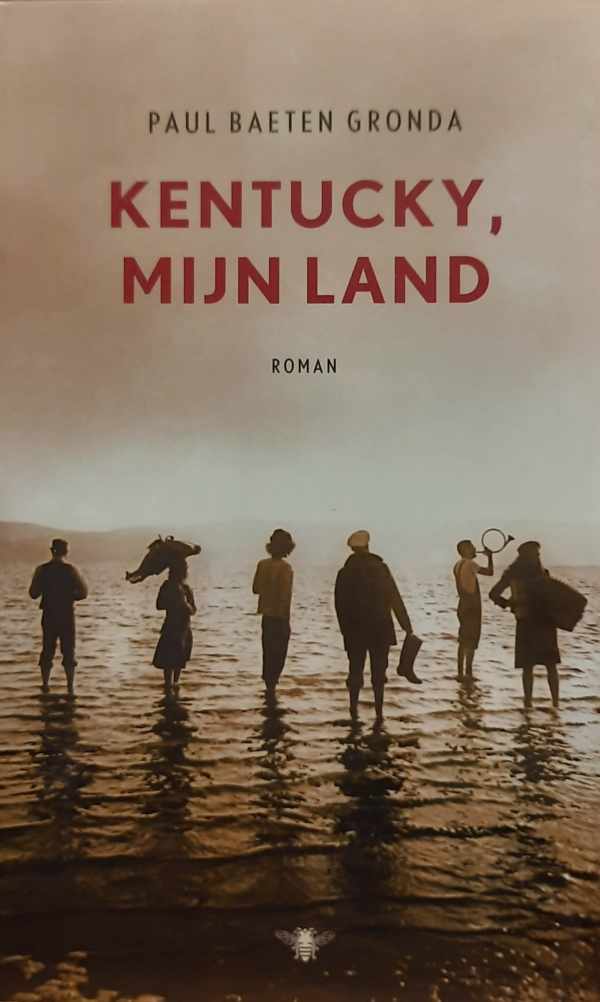
Amsterdam
Bezige Bij
2009
BEL 
condition: Very good/Très bel état/Sehr gut/Zeer goed
book number: 202402072039
Kentucky, mijn land - roman
Pb, in-8, 157 pp.
BAETEN GRONDA Paul@ wikipedia
€ 10.0

Het mooie leven en de oorlogen van anderen. Of de avonturen van Mr. Pyle, gentleman en spion in Europa. Historische roman.
Softcover, pb, 8vo, 517 pp.
BARBERO Alessandro@ wikipedia
€ 10.0
Lijfelijkheid
Pocket, 184 pp.
BARILLE Elisabeth@ wikipedia
€ 10.0
In Vlaanderen. Hoe dichterbij hoe beter. Nederlandse schrijvers over Vlaanderen.
Softcover, pb, 8vo, 172 pp.
BART, BERANOVA, DE BOER, BORGART, DENDERMONDE, DONK, DE GROEN, HOFMAN, VAN HOUTEN, PEYPERS, VINKENOOG, DE WIT@ wikipedia
€ 10.0
We found 7 news items
Colonial Impotence. Virtue and Violence in a Congolese Concession (1911–1940)
ID: 202109161519
•

Verschenen bij De Gruyter
About this book
In Colonial Impotence, Benoît Henriet studies the violent contradictions of colonial rule from the standpoint of the Leverville concession, Belgian Congo’s largest palm oil exploitation. Leverville was imagined as a benevolent tropical utopia, whose Congolese workers would be "civilized" through a paternalist machinery. However, the concession was marred by inefficiency, endemic corruption and intrinsic brutality. Colonial agents in the field could be seen as impotent, for they were both unable and unwilling to perform as expected. This book offers a new take on the joint experience of colonialism and capitalism in Southwest Congo, and sheds light on their impact on local environments, bodies, societies and cosmogonies.
Author information
Benoît Henriet, Vrije Universiteit Brussel, Belgium.
Reviews
"This is a major contribution to the historiography of colonial central Africa and the growing literature on the concessionary model used in many different colonial contexts." – Jeremy Rich, Professor of History, Marywood University
"This compelling book unveils the importance of hubris and self-deception in the deployment of colonial capitalism. Henriet recreates Leverville as a capitalistic site and a matrix of emotions and affects, of virtuous excesses and moral failures. His concept of 'impotence,' broadly conceptualized as a sexual, social, political, and economic formation, is an important addition to our knowledge of relations of power in the colony." – Florence Bernault, Centre d'histoire, Sciences Po (Paris)

Verschenen bij De Gruyter
About this book
In Colonial Impotence, Benoît Henriet studies the violent contradictions of colonial rule from the standpoint of the Leverville concession, Belgian Congo’s largest palm oil exploitation. Leverville was imagined as a benevolent tropical utopia, whose Congolese workers would be "civilized" through a paternalist machinery. However, the concession was marred by inefficiency, endemic corruption and intrinsic brutality. Colonial agents in the field could be seen as impotent, for they were both unable and unwilling to perform as expected. This book offers a new take on the joint experience of colonialism and capitalism in Southwest Congo, and sheds light on their impact on local environments, bodies, societies and cosmogonies.
Author information
Benoît Henriet, Vrije Universiteit Brussel, Belgium.
Reviews
"This is a major contribution to the historiography of colonial central Africa and the growing literature on the concessionary model used in many different colonial contexts." – Jeremy Rich, Professor of History, Marywood University
"This compelling book unveils the importance of hubris and self-deception in the deployment of colonial capitalism. Henriet recreates Leverville as a capitalistic site and a matrix of emotions and affects, of virtuous excesses and moral failures. His concept of 'impotence,' broadly conceptualized as a sexual, social, political, and economic formation, is an important addition to our knowledge of relations of power in the colony." – Florence Bernault, Centre d'histoire, Sciences Po (Paris)

White Trash: The 400-Year Untold History of Class in America
ID: 201606210914
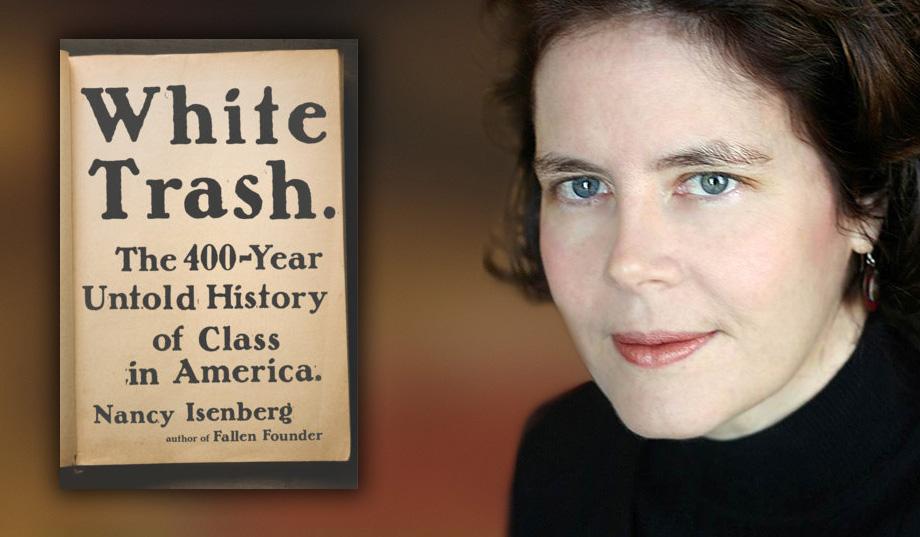
In her groundbreaking history of the class system in America, extending from colonial times to the present, Nancy Isenberg takes on our comforting myths about equality, uncovering the crucial legacy of the ever-present, always embarrassing––if occasionally entertaining––"poor white trash."
The wretched and landless poor have existed from the time of the earliest British colonial settlement. They were alternately known as “waste people,” “offals,” “rubbish,” “lazy lubbers,” and “crackers.” By the 1850s, the downtrodden included so-called “clay eaters” and “sandhillers,” known for prematurely aged children distinguished by their yellowish skin, ragged clothing, and listless minds.
Surveying political rhetoric and policy, popular literature and scientific theories over four hundred years, Isenberg upends assumptions about America’s supposedly class-free society––where liberty and hard work were meant to ensure real social mobility. Poor whites were central to the rise of the Republican Party in the early nineteenth century, and the Civil War itself was fought over class issues nearly as much as it was fought over slavery.
Reconstruction pitted "poor white trash" against newly freed slaves, which factored in the rise of eugenics–-a widely popular movement embraced by Theodore Roosevelt that targeted poor whites for sterilization. These poor were at the heart of New Deal reforms and LBJ’s Great Society; they haunt us in reality TV shows like Here Comes Honey Boo Boo and Duck Dynasty. Marginalized as a class, "white trash" have always been at or near the center of major political debates over the character of the American identity.
We acknowledge racial injustice as an ugly stain on our nation’s history. With Isenberg’s landmark book, we will have to face the truth about the enduring, malevolent nature of class as well.
(source:goodreads)
Land: USA

Wereldliteratuur op tijdlijn geplaatst
ID: 201602030957
 In 'Categories' (Search pagina) werd LITERATURE WORLD gerangschikt op het jaar van de eerste oorspronkelijke editie van de weerhouden titel.
In 'Categories' (Search pagina) werd LITERATURE WORLD gerangschikt op het jaar van de eerste oorspronkelijke editie van de weerhouden titel.Zo maken we een reis door de tijd, beginnend bij Xenofon (398 v. Chr.) tot Maamoura (2010). In totaal worden 388 titels (incl. dubbels) gepresenteerd.

Achieving Our Country - Leftist Thought in Twentieth-Century America
ID: 199908270286
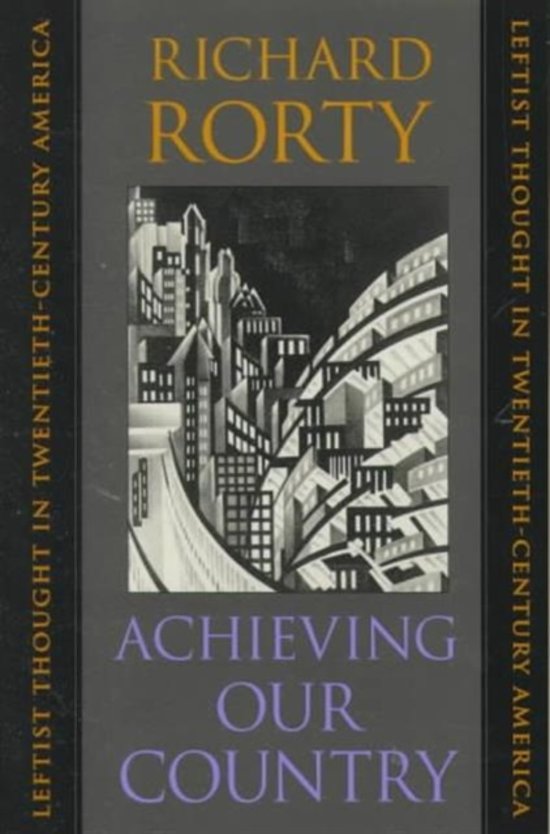
Must the sins of America's past poison its hope for the future? Lately the American Left, withdrawing into the ivied halls of academe to rue the nation's shame, has answered yes in both word and deed. In Achieving Our Country, one of America's foremost philosophers challenges this lost generation of the Left to understand the role it might play in the great tradition of democratic intellectual labor that started with writers like Walt Whitman and John Dewey. How have national pride and American patriotism come to seem an endorsement of atrocities--from slavery to the slaughter of Native Americans, from the rape of ancient forests to the Vietnam War? Achieving Our Country traces the sources of this debilitating mentality of shame in the Left, as well as the harm it does to its proponents and to the country. At the center of this history is the conflict between the Old Left and the New that arose during the Vietnam War era. Richard Rorty describes how the paradoxical victory of the antiwar movement, ushering in the Nixon years, encouraged a disillusioned generation of intellectuals to pursue High Theory at the expense of considering the place of ideas in our common life. In this turn to theory, Rorty sees a retreat from the secularism and pragmatism championed by Dewey and Whitman, and he decries the tendency of the heirs of the New Left to theorize about the United States from a distance instead of participating in the civic work of shaping our national future. In the absence of a vibrant, active Left, the views of intellectuals on the American Right have come to dominate the public sphere. This galvanizing book, adapted from Rorty's Massey Lectures of 1997, takes the first step toward redressing the imbalance in American cultural life by rallying those on the Left to the civic engagement and inspiration needed for achieving our country.
REVIEWS
Richard Rorty [is] John Dewey's ablest intellectual heir and one of the most influential philosophers alive...In lively prose, [Achieving Our Country] offers a pointed and necessary reminder that left academics have too often been content to talk to each other about the theory of hegemony while the right has been busy with the practice of it. If those criticized in the book dismiss it the way they brush aside the Blooms and D'Souzas of the world, an opportunity will be lost. Rorty invites a serious conversation about the purposes of intellectual work and the direction of left politics. I wouldn't want him to have the last word, but the conversation should be joined. If it is conducted with the verve of Achieving Our Country, and if it shares Rorty's genuine commitment to revitalizing the left as a national force, it will be a very good thing. The Nation There is much to be debated, much that will probably infuriate, in Rorty's picture of contemporary Left intellectuals... Achieving Our Country is meant to be pointedly polemical, and Rorty...[has] succeeded at stirring up emotions as well as thoughts. -- Vincent J. Bertolini American Literature In his philosophically rigorous new book, Achieving Our Country, Richard Rorty raises a provocative if familiar question: Whatever happened to national pride in this country?...[and] he offers a persuasive analysis of why such pride has been lost. -- Christopher Lehmann-Haupt New York Times Achieving Our Country is an appeal to American intellectuals to abandon the intransigent cynicism of the academic, cultural left and to return to the political ambitions of Emerson, Dewey, Herbert Croly and their allies. What Rorty has written--as deftly, amusingly and cleverly as he always writes--is a lay sermon for the untheological...[Americans] do not need to know what God wants but what we are capable of wanting and doing...[Rorty argues] that we would do better to try to improve the world than lament its fallen condition. On that he will carry with him a good many readers. -- Alan Ryan New York Times Book Review [In this] slim, elegantly written book...Rorty scolds other radical academics for abandoning pride in the nation's democratic promise; in their obsession with 'victim studies,' he argues, they have neglected to inspire the 'shared social hope' that motivated every mass movement against injustice from the abolitionists to the voting rights campaign. -- Michael Kazin Washington Post Book World The heart of Achieving Our Country is Professor Rorty's critique of the cultural left. Barricaded in the university, this left has isolated itself, he asserts, from the bread-and-butter issues of economic equality and security and the practical political struggles that once occupied the reform tradition...Controversies are seeded like land mines in every paragraph of this short book. -- Peter Steinfels New York Times Mr. Rorty calls for a left which dreams of achieving America, a patriotic left he recognises from the days of the New Deal and which he remembers from the early 1960s when, for example, people campaigned for civil-rights laws to make their country better. Where, he wonders, has such reformist pride gone? In place of Marxist scholasticism , Mr. Rorty wants a left which makes reducing inequalities part of a civic religion . Yet material differences are not the only sort of thing that bothers Mr. Rorty about the contemporary United States. On a communitarian note, he argues that the civic religion he advocates should include commitment to shared values that rise above ethnic or minority loyalties. The Economist Richard Rorty's Achieving Our Country is short, comprehensible and urges a civic and political agenda--the re-engagement of the Left...Rorty seeks to revive the vision of Walt Whitman and John Dewey, and what he sees as the real American Dream--a compassionate society held together by nothing more absolute than consensus and the belief that humane legal and economic agreements stand at the centre of democratic civilisation. -- Brian Eno The Guardian, Featured in the Books of the Year issue for 1998 A succinct, stimulating, crisply written book...Rorty proposes a return to the liberal values that animated American reform movements for the first two-thirds of this century: from the long struggle of labor unions to obtain better conditions for workers, to the efforts of leaders like Woodrow Wilson, Theodore and Franklin Roosevelt, John Kennedy, and Lyndon Johnson to redistribute the nation's wealth more equitably...Although Rorty is an academic philosopher, in this book, addressed to the general reader, he employs clear, vigorous language that makes reading a pleasure rather than a chore. -- Merle Rubin Christian Science Monitor Rorty made us realise how much poorer we are if Jefferson, Emerson, Whitman, Thoreau, Stowe, Peirce, William James, Santayana and Dewey are not familiar landmarks in our intellectual scenery...If we [scoff] at Rorty's patriotic American leftism, we may find that it sets off some doubts that will come back to haunt us. When we quibble over his interpretations of our favourite thinkers, are we not confirming his stereotype of left pedantry? When we sniff at him for keeping company with rightists and renegades, do we not bear out his idea of a Left that is keener on its own purity than on fighting for the poor? As we look down our noses at the etiolation of socialism in America, should we not reckon the costs and benefits of European mass movements, and reflect on the political history of the anti-Americanism that comes to us so easily? Before leftist subjects of Her Majesty get snooty about American democracy, we might stop and wonder whose interests are served by our unshakable optimism about the past. The unguarded naiveties of Achieving Our Country are not quite as negligent as they look, and the book may well turn out to be one of the first signs of a long-delayed breaking of the ice in socialist politics following the end of the Cold War. The fact that Rorty's old-style American leftism is closer to British New Labour than to good old socialism may prove not that he is confused, but that it is time to reset our political chronometers. -- Jonathan Ree London Review of Books Achieving Our Country criticizes academic theorists and reminds us that left-wing reformers in previous periods of American history either made their careers outside the university or, at least, developed strong links with the decidedly non-academic labor movement...Rorty's distinction between a 'cultural Left' and a reformist Left is useful. As Freud replaced Marx in the imagination of academic theorists, Rorty explains, a cultural left--one that thinks more about stigma than about money, more about deep and hidden psychosexual motivations than about shallow and evident greed --came into being. -- Alan Wolfe The Chronicle of Higher Education Richard Rorty is considered by many to be America's greatest living philosopher. That assessment is firmly supported in this short, profound, and lucid volume. In Achieving Our Country, Rorty does what many of us think philosophers ought to do, namely, lay a foundation and establish a framework within which we as individuals and as a society can conceptualize and fashion operational theories by which to live and prosper together...I can think of no more important book that I have read in recent years or one that I could more fervently recommend to the readers of this journal that Rorty's Achieving Our Country. -- Thomas R. DeGregori Journal of Economic Issues For many years now, Rorty has been one of the most important American pragmatists, defending the experimental modes of inquiry first propounded by John Dewey from both traditionalists and postmodernists...In Achieving Our Country, a brief but eloquent book, Rorty begs his academic colleagues to return to the real world. I am nostalgic for the days, he writes, 'when leftist professors concerned themselves with issues in real politics (such as the availability of health care to the poor and the need for strong labor unions) rather than with academic politics. -- Jefferson Decker In These Times Rorty offers a resolute defense of pragmatic and reformist politics, coupled with a sophisticated rereading of the history of 20th-century American leftist thought. The result is a book that ends up reaffirming the great achievements of American left liberalism--strong unions, Social Security, and the principled regulation of corporate power--even as it illuminates the ways in which the cultural myopia of today's academic left has placed those achievements in jeopardy...In his insistence that there is a great American tradition of leftist reform, and that this rendition can be reinvigorated only by a return to the idea of the nation, Rorty has constructed as humane and as hopeful a defense of patriotism as one can imagine. -- James Surowiecki Boston Phoenix Rorty's new book urges a return to American liberalism's days of hope, pride, and struggle within the system...Subtle without being dense, good-natured in its defiance of a whole spectrum of conventional wisdoms, Achieving Our Country is a rare book. It should be compulsory reading--if that weren't contrary to all it stands for. -- Richard Lamb The Reader's Catalog A deeply considered diagnosis, a vital set of prophecies. Publishers Weekly Richard Rorty is remarkable not just for being a gadfly to analytical philosophers, but for his immense reading, his lively prose and his obvious moral engagement with the issues...The conversation of philosophy would be much poorer without him...Achieving Our Country is a valuable addition to Rorty's writings...He has things to say that are important and timely...They are said powerfully. -- Hilary Putnam Times Literary Supplement It is refreshing to find so hard-hitting a portrait of the contemporary academic Left in the work of one of its own. -- Peter Berkowitz Commentary Richard Rorty is an inspirational writer who makes a valiant effort in this book to create an atmosphere of cooperation among those he characterizes as he Reformist Left. He wants us to return to the ideals of John Dewey and Walt Whitman and achieve the greatness that is possible in a country of our wealth and dominance. -- Edward J. Bander Bimonthly Review of Law Books A bracing tonic against the jejune profundities and the self-centered talking points by the far Right that find their way into the media. In sharply etched arguments Rorty weaves in philosophical and historical perspectives...His message isn't one of resignation, rather of hope grounded in the Left's potential for reinventing itself. He thinks it's time for the Left to stop demonizing capitalist America and to develop once again a political program of its own. -- Terry Doran Buffalo News On behalf of countless readers whose reaction to most left academic writing over the past two decades has increasingly been not so much either agreement or disagreement as an overpowering sense of So what?, the eminent philosopher Richard Rorty has composed a marvelous philippic against the entrenched irrelevance of much of the American left...Rorty's most important insight is into the political worldview of the academic left: that it is essentially nonpolitical...He offers a withering comparison of the core beliefs of the current cultural left with those of one of its forebears, Walt Whitman. -- Harold Meyerson Dissent Achieving our country (the phrase is culled from James Baldwin's The Fire Next Time) isn't just a redeemable aim, it's what good radical politics has always been about. -- Gideon Calder Radical Philosophy Politically progressive academics should consider carefully Rorty's arguments...They pose important questions about American politics and public intellectual practice. -- Harvey Kaye Times Higher Educational Supplement
Land: USA

EDWARD CRANKSHAW IS DEAD AT 75; AUTHOR ON SOVIET AND HAPSBURGS
ID: 198412041025
EDWARD CRANKSHAW IS DEAD AT 75
By WOLFGANG SAXON
Published: December 4, 1984
Edward Crankshaw, one of the most respected authors on the Soviet Union and chronicler of the Hapsburgs, died last Thursday in his native Britain after what was described as a ''long and painful illness.'' He was 75 years old and lived in Hawkhurst, in rural Kent.
His death was reported Sunday in The Observer, the British weekly for which he kept watch on the Soviet scene starting in 1947. Mr. Crankshaw, who spurned the label of ''Kremlinologist,'' was regarded as Britain's premier journalistic expert on Soviet politics.
The author of about 20 books, including three novels, Mr. Crankshaw contribued a steady flow of prefaces, essays and articles to publications in Britain and the United States, including The New York Times. In addition, he commented on Soviet affairs for the BBC.
Difficult to place politically, Mr. Crankshaw reluctantly became a Soviet specialist when The Observer asked him to take the assignment after World War II, part of which he had spent in Moscow. One of the conclusions he had reached was that Kremlin policies must be seen as something that did not start with the Bolshevik takeover in 1917, but had ancient roots. He Avoided Speculation
Thus, Mr. Crankshaw avoided speculations about absences from the Kremlin wall at anniversary parades. Instead, his basic impressions had been formed when the Russians were fighting for survival, and he took heart from Stalin's evocations of historical ''Holy Russia.''
His political testament came in a preface written this year to a selection from his writings, ''Putting Up With the Russians.''
As a conservative dedicated to the survival of European civilization, he rejected the harsh tones adopted by President Reagan and his supporters, accusing them of trying to turn the Soviet Union into a pariah. Mr. Crankshaw viewed detente with some skepticism, but he insisted on the need for co- existence.
He was the author of ''Russia Without Stalin'' in 1956, regarding the changes in everyday life in the post- Stalin era. He also wrote ''Khrushchev's Russia'' (1960) and ''Khrushchev: A Career,'' published six years later.
He then wrote the introduction for ''Khrushchev Remembers,'' a rich compilation of comments, speeches, conversations and interviews by Nikita I. Khruschev, the Kremlin leader who denounced the Stalinist terror. 'Khrushchev Himself'
Mr. Crankshaw, who also contributed copious footnotes and commentary to the Khrushchev book, helped defend the book against doubters. He said that by ''style and content'' the words were ''Khrushchev himself, quite unmistakably speaking.'' His faith in the book's authenticity has come to be shared by most others since its publication in 1970.
Though ailing for many years, Mr. Crankshaw, a slight and courtly man, continued to write even in bed whenever he was unable to move about.
His last volume published in this country was ''Bismarck'' in 1982. Writing in The New York Times Book Review, George L. Mosse called the book ''a cautionary tale about political and military power'' that sees Bismarck's ''apparent success as a failure because the Iron Chancellor exalted the amoral concept of politics into a principle.''
Edward Crankshaw was born on Jan. 3, 1909, in rural Essex. As a boy, he often visited the London magistrate's court where his father, Arthur, worked as chief clerk. He attended Bishop's Stortford College but left early - hence his claim to having been largely self- taught.
Instead, Mr. Crankshaw went to the Continent to travel, and he lived in Vienna, becoming fluent in German. His Austrian years turned out to be formative ones for his mind as he watched democracy crumble in the new Austrian republic. They also instilled him with a passion for literature and music.
From Europe, he wrote for British publications subjects ranging from twelve-tone music to books, art and the theater. But he gave up journalism to write ''Joseph Conrad: Some Aspects of the Art of the Novel,'' a study of Conrad's methods and the novelist's art in general. Another book, ''Vienna: The Image of a Culture in Decline,'' appeared in 1938. Posted to Moscow in '41
In 1936, Mr. Crankshaw was commissioned into Britain's Territorial Army. In 1941, he was posted to Moscow as an intelligence officer, and he did all he could to understand the Russians, their history, national character and government.
Having also traveled on the periphery of the Soviet Union, he was asked by The Observer to return to journalism as its Russian expert. His early books on the subject were ''Britain and Russia'' (1945), ''Russia and the Russians'' (1947) and ''Russia by Daylight'' (1951).
A well-received history was The Shadow of the Winter Palace: The Drift to Revolution, 1825-1917 which appeared in 1976. Other well-received books were ''The Fall of the House of Hapsburg'' (1963) and ''The Hapsburgs'' (1971).
Of Mr. Crankshaw's ''Maria Theresa'' (1969), Thomas Lask wrote in his review in The New York Times, ''Mr. Crankshaw has managed in what is a model of compression and judicious selection to rescue Maria Theresa from the history books and to turn a monument into a warm and appealing woman.''
Mr. Crankshaw is survived by his wife, the former Clare Chesterton Carr.
By WOLFGANG SAXON
Published: December 4, 1984
Edward Crankshaw, one of the most respected authors on the Soviet Union and chronicler of the Hapsburgs, died last Thursday in his native Britain after what was described as a ''long and painful illness.'' He was 75 years old and lived in Hawkhurst, in rural Kent.
His death was reported Sunday in The Observer, the British weekly for which he kept watch on the Soviet scene starting in 1947. Mr. Crankshaw, who spurned the label of ''Kremlinologist,'' was regarded as Britain's premier journalistic expert on Soviet politics.
The author of about 20 books, including three novels, Mr. Crankshaw contribued a steady flow of prefaces, essays and articles to publications in Britain and the United States, including The New York Times. In addition, he commented on Soviet affairs for the BBC.
Difficult to place politically, Mr. Crankshaw reluctantly became a Soviet specialist when The Observer asked him to take the assignment after World War II, part of which he had spent in Moscow. One of the conclusions he had reached was that Kremlin policies must be seen as something that did not start with the Bolshevik takeover in 1917, but had ancient roots. He Avoided Speculation
Thus, Mr. Crankshaw avoided speculations about absences from the Kremlin wall at anniversary parades. Instead, his basic impressions had been formed when the Russians were fighting for survival, and he took heart from Stalin's evocations of historical ''Holy Russia.''
His political testament came in a preface written this year to a selection from his writings, ''Putting Up With the Russians.''
As a conservative dedicated to the survival of European civilization, he rejected the harsh tones adopted by President Reagan and his supporters, accusing them of trying to turn the Soviet Union into a pariah. Mr. Crankshaw viewed detente with some skepticism, but he insisted on the need for co- existence.
He was the author of ''Russia Without Stalin'' in 1956, regarding the changes in everyday life in the post- Stalin era. He also wrote ''Khrushchev's Russia'' (1960) and ''Khrushchev: A Career,'' published six years later.
He then wrote the introduction for ''Khrushchev Remembers,'' a rich compilation of comments, speeches, conversations and interviews by Nikita I. Khruschev, the Kremlin leader who denounced the Stalinist terror. 'Khrushchev Himself'
Mr. Crankshaw, who also contributed copious footnotes and commentary to the Khrushchev book, helped defend the book against doubters. He said that by ''style and content'' the words were ''Khrushchev himself, quite unmistakably speaking.'' His faith in the book's authenticity has come to be shared by most others since its publication in 1970.
Though ailing for many years, Mr. Crankshaw, a slight and courtly man, continued to write even in bed whenever he was unable to move about.
His last volume published in this country was ''Bismarck'' in 1982. Writing in The New York Times Book Review, George L. Mosse called the book ''a cautionary tale about political and military power'' that sees Bismarck's ''apparent success as a failure because the Iron Chancellor exalted the amoral concept of politics into a principle.''
Edward Crankshaw was born on Jan. 3, 1909, in rural Essex. As a boy, he often visited the London magistrate's court where his father, Arthur, worked as chief clerk. He attended Bishop's Stortford College but left early - hence his claim to having been largely self- taught.
Instead, Mr. Crankshaw went to the Continent to travel, and he lived in Vienna, becoming fluent in German. His Austrian years turned out to be formative ones for his mind as he watched democracy crumble in the new Austrian republic. They also instilled him with a passion for literature and music.
From Europe, he wrote for British publications subjects ranging from twelve-tone music to books, art and the theater. But he gave up journalism to write ''Joseph Conrad: Some Aspects of the Art of the Novel,'' a study of Conrad's methods and the novelist's art in general. Another book, ''Vienna: The Image of a Culture in Decline,'' appeared in 1938. Posted to Moscow in '41
In 1936, Mr. Crankshaw was commissioned into Britain's Territorial Army. In 1941, he was posted to Moscow as an intelligence officer, and he did all he could to understand the Russians, their history, national character and government.
Having also traveled on the periphery of the Soviet Union, he was asked by The Observer to return to journalism as its Russian expert. His early books on the subject were ''Britain and Russia'' (1945), ''Russia and the Russians'' (1947) and ''Russia by Daylight'' (1951).
A well-received history was The Shadow of the Winter Palace: The Drift to Revolution, 1825-1917 which appeared in 1976. Other well-received books were ''The Fall of the House of Hapsburg'' (1963) and ''The Hapsburgs'' (1971).
Of Mr. Crankshaw's ''Maria Theresa'' (1969), Thomas Lask wrote in his review in The New York Times, ''Mr. Crankshaw has managed in what is a model of compression and judicious selection to rescue Maria Theresa from the history books and to turn a monument into a warm and appealing woman.''
Mr. Crankshaw is survived by his wife, the former Clare Chesterton Carr.

10 december 1962: John Steinbeck's speech at the Nobel Banquet at the City Hall in Stockholm.
ID: 196212102005
"Literature was not promulgated by a pale and emasculated critical priesthood singing their litanies in empty churches - nor is it a game for the cloistered elect, the tinhorn mendicants of low calorie despair. Literature is as old as speech. It grew out of human need for it, and it has not changed except to become more needed." - Steinbeck
"Socialism never took root in America because the poor see themselves not as an exploited proletariat but as temporarily embarrassed millionaires" - Steinbeck
"Our species is the only creative species, and it has only one creative instrument, the individual mind and spirit of a man. Nothing was ever created by two men. There are no good collaborations, whether in art, in music, in poetry, in mathematics, in philosophy. Once the miracle of creation has taken place, the group can build and extend it, but the group never invents anything. The preciousness lies in the lonely mind of a man. And now the forces marshaled around the concept of the group have declared a war of extermination on that preciousness, the mind of man. By disparagement, by starvation, by repressions, forced direction, and the stunning blows of conditioning, the free, roving mind is being pursued, roped, blunted, drugged. It is a sad suicidal course our species seems to have taken. And this I believe: that the free, exploring mind of the individual human is the most valuable thing in all the world.
And this I would fight for: the freedom of the mind to take any direction it wishes, undirected. And this I must fight against: any idea, religion, or government which limits or destroys the individual. This is what I am and what I am about. I can understand why a system built on a pattern must try to destroy the free mind, for this is the one thing which can by inspection destroy such a system. Surely I can understand this, and I hate it and I will fight against it to preserve the one thing that separates us from the uncreative beasts. If the glory can be killed, we are lost."
-East of Eden 1952"I guess this is why I hate governments. It is always the rule, the fine print, carried out by the fine print men. There's nothing to fight, no wall to hammer with frustrated fists."-Travels with Charley, 1962
"What good's an opinion if you don't know?"-Travels with Charley
"Power does not corrupt. Fear corrupts... perhaps the fear of a loss of power."
"...there is a base theme. Try to understand men, if you understand each other you will be kind to each other. Knowing a man well never leads to hate and nearly always leads to love."

MILL John Stuart (1806-1873): politieke economie, vrijheid en gezag
ID: 180605204545
John Stuart Mill (20 mei 1806 – 8 mei 1873) was een Engels filosoof en econoom, en de meest invloedrijke vrije denker van de 19e eeuw. Hij was een voorstander van het utilitarisme, de ethische theorie die voorgesteld werd door zijn peetvader Jeremy Bentham.
John Stuart Mill werd geboren in zijn vaders huis in Pentonville, Londen, als de oudste zoon van James Mill. Hij kreeg zijn onderwijs van zijn vader, met advies en assistentie van Jeremy Bentham en Francis Place. Hij kreeg een strenge opvoeding en werd nadrukkelijk afgeschermd van andere jongens van zijn leeftijd. Zijn vader, een navolger van Bentham, had als zijn specifieke doel om een genieus intellect te creëren dat de doelen en uitvoering van het utilisme zou doen verder leven na de dood van Bentham en hemzelf.
Tegen de tijd dat hij drie was kon hij het Griekse alfabet opnoemen, en toen hij acht werd had hij Aesopus' 'Fabels' gelezen en wist hij van Plato. In 1818 begon hij aan een studie logica en het jaar erop kreeg hij te maken met politieke economie.
Hij publiceerde zijn eerste belangrijke boek in 1842, The system of logic. Een van de belangrijkste theorieën is het beginsel van causaliteit – Als A altijd door B wordt gevolgd, kan worden verondersteld dat dit in de toekomst ook altijd zo zal zijn.
In 1869 publiceerde hij Subjection of Women, waarin hij de vrouwenrechten verdedigde. Hij was dan al vier jaar parlementslid waar hij eveneens ijverde voor het vrouwenkiesrecht en de vooruitstrevende liberalen steunde. Zijn vrouw Henriëtte, die in 1858 stierf, zou het boek geschreven hebben, maar op haar naam mocht het niet worden uitgegeven. Tot op de dag van vandaag staat het boek officieel op naam van John Stuart Mill.
http://nl.wikipedia.org/wiki/John_Stuart_Mill (20070226)
Writings by John Stuart Mill
[books / book excerpts]
· The Logic of the Moral Sciences. Excerpted from A System of Logic. London, 1843, 8th ed. 1872. [French translation]
· Essays on Some Unsettled Questions of Political Economy. London, 1844.
· Principles of Political Economy. London, 1848, 7th ed. 1871.
· On Liberty. London, 1859. [French translation]
· Dissertations and Discussions. London, 1859, 4th ed. 1882.
· Considerations on Representative Government. London, 1861.
· Utilitarianism. London, 1863. Reprinted from Fraser's Magazine, 1861. [French translation]
· Auguste Comte and Positivism. London, 1865. Reprinted from Westminster Review, 1865. [French translation]
· An Examination of Sir Hamilton's Philosophy. London, 1865.
· The Subjection of Women. London, 1869. [French translation] [Spanish translation]
· Autobiography. London, 1873. [French translation]
· Three Essays on Religion [Nature + Utility of Religion + Theism]. London, 1874.
· Chapters on Socialism. Fortnightly Review, 1879.
[articles]
· Free Discussion (1). Morning Chronicle, 1823.
· Free Discussion (2). Morning Chronicle, 1823.
· Free Discussion (3). Morning Chronicle, 1823.
· A Defense of Bentham. Excerpted from 'Whewell on Moral Philosophy'. Westminster Review, 1836.
· Note on N. W. Senior's Political Economy. In Senior's Outline of the Science of Political Economy, London, 1836.
· The Negro Question. Fraser's Magazine, 1850.
· Bentham. 1838, 2nd ed. 1859.
· The Contest in America. Fraser's Magazine, 1862.
· Inaugural Address. Delivered to the University of St. Andrews, 1867.
· Meetings in Royal Parks. Delivered in Parliament, 1867.
· Speech in Favour of Capital Punishment. Delivered in Parliament, 1868.
· Thornton on Labour and its Claims. Fortnightly Review, 1869.
· Theism. In Three Essays on Religion, London, 1874.
· Nature. In Three Essays on Religion, London, 1874.
· Utility of Religion. In Three Essays on Religion, London, 1874.
[letters]
· To James Mill. April 25, 1821.
· To ? March 18, 1840.
· To Gustave D'Eichthal. January 10, 1842.
· To ? May 13, 1865.
· To a Gentleman in Ohio. September 1, 1865.
--------------------------------------------------------------------------------
Writings about John Stuart Mill
[dictionary / encyclopaedia entries]
· John Stuart Mill. The Cambridge History of English and American Literature.
· John Stuart Mill. The Columbia Encyclopedia.
· John Stuart Mill. The Concise Encyclopedia of Economics.
· John Stuart Mill. Encyclopædia Britannica.
· John Stuart Mill. Encyclopædia Britannica (1911).
· John Stuart Mill. Internet Encyclopedia of Philosophy.
· John Stuart Mill. Island of Freedom.
· John Stuart Mill. The Johns Hopkins Guide to Literary Theory & Criticism.
· John Stuart Mill. The Literary Encyclopedia.
· John Stuart Mill. The Penguin Dictionary of Philosophy.
· John Stuart Mill. Spartacus Educational.
· John Stuart Mill. The Stanford Encyclopedia of Philosophy.
· John Stuart Mill. Wikipedia.
[other writings]
· Law Reform in England. The United States Democratic Review, 1851.
· John Stuart Mill and his Residence. Anonymous. Littell's Living Age, 1868.
· John Stuart Mill. By G. M. Towle. Appleton's Journal, 1870.
· John Stuart Mill. By M. D. Conway. Harper's New Monthly Magazine, 1873.
· The Reality of Duty. Anonymous. Littell's Living Age, 1876.
· John Stuart Mill (I). By Lyell Adams. New Englander and Yale Review, 1877.
· John Stuart Mill (II). By Lyell Adams. New Englander and Yale Review, 1877.
· John Stuart Mill (III). By Lyell Adams. New Englander and Yale Review, 1877.
· John Stuart Mill and the Destruction of Theism. By President Shairp. Princeton Review, 1878.
· James and John Stuart Mill. Littell's Living Age, 1882.
· John Stuart Mill and the London and Westminster Review. By C. Marion D. Robertson Towers. The Atlantic Monthly, 1892.
· A Letter to John Stuart Mill. By Winthrop More Daniels. The Atlantic Monthly, 1900.
· John Stuart Mill. By Leslie Stephen. In The English Utilitarians. London, 1900, vol. III.
· Variations in the Editions of J. S. Mill's Principles of Political Economy. By M. A. Ellis. Economic Journal, 1906.
· Biography. By O. M. W. Sprague. The Cambridge History of English and American Literature, Cambridge, 1921.
· John Stuart Mill: Traditional and Revisionist Interpretations. By John Gray. Literature and Liberty, 1979.
· Early Buddhism and John Stuart Mill's Thinking. By Vijitha Rajapakse. Philosophy East and West, 1987.
· J. S. Mill: the Utilitarian Influence in the Demise of laissez-faire. By Ellen Frankel Paul. Journal of Libertarian Studies, 1978.
· Wallace's Campaign to Nationalize Land. By M. Gaffney. The American Journal of Economics and Sociology, October 1, 1997.
· Utility and Preferences. By Soshichi Uchii. October 25, 1998.
· The Worm at the Root of the Passions: Poetry and Sympathy in Mill's Utilitarianism. By L. A. Paul. Utilitas, 1998.
· The Carlyle-Mill "Negro Question" Debate. ca. 2000.
· Mill, Liberty, and the Facts of Life. By Shannon C. Stimson and Murray Milgate. 2001.
· Mill's "Proof" of the Principle of Utility. By Geoffrey Sayre-McCord. Social Philosophy and Policy, 2001.
· J.S. Mill and the Diversity of Utilitarianism. By Daniel Jacobson. Philosophers' Imprint, 2003.
· Mill between Aristotle & Bentham. By Martha C. Nussbaum. Daedalus, March 22, 2004.
· The Ethics of Identity. By Kwame Anthony Appiah. The New York Times, June 12, 2005.
· The Influence of Mary Bentham on John Stuart Mill. By Catherine Pease-Watkin. Journal of Bentham Studies, 2006.
· Narrative, Imagination, and the Religion of Humanity in Mill's Ethics. By Colin Heydt. Journal of the History of Philosophy, 2006.
· Mill, Bentham and 'Internal Culture'. By Colin Heydt. British Journal for the History of Philosophy, May, 2006.
[reviews]
· Autobiography. New Englander and Yale Review, 1874.
· Autobiography. New Englander and Yale Review, 1874.
· Autobiography. Scribner's Monthly, 1874.
· Autobiography. North American Review, 1874.
· Autobiography. Littell's Living Age, 1874.
· Autobiography and Three Essays on Religion. New Englander and Yale Review, 1875.
· Considerations on Representative Government. New Englander and Yale Review, 1862.
· Dissertations and Discussions, Vols. I-III. New Englander and Yale Review, 1866.
· Dissertations and Discussions, Vol. IV. New Englander and Yale Review, 1867.
· Dissertations and Discussions, Vol. I. North American Review, 1865.
· Dissertations and Discussions, Vol. IV. North American Review, 1868.
· Examination of Sir Hamilton's Philosophy. New Englander and Yale Review, 1865.
· Inaugural Address at the University of St. Andrew's. North American Review, 1865.
· On Liberty. North America Review, 1863.
· On Liberty. The Cambridge History of English and American Literature, Cambridge, 1921.
· The Philosophy of Auguste Comte. New Englander and Yale Review, 1866.
· Principles of Political Economy. The Prospective Review, 1848.
· Principles of Political Economy. North American Review, 1848.
· Principles of Political Economy. North American Review, 1864.
· Principles of Political Economy. DeBow's Review, 1867.
· Principles of Political Economy. New Englander and Yale Review, 1872.
· Principles of Political Economy. The Cambridge History of English and American Literature, Cambridge, 1921.
· The Subjection of Women. North American Review, 1869.
· The Subjection of Women. New Englander and Yale Review, 1869.
· A System of Logic. North American Review, 1854.
· A System of Logic. The Cambridge History of English and American Literature, Cambridge, 1921.
· Three Essays on Religion. North American Review, 1875.
· Utilitarianism. The Cambridge History of English and American Literature, Cambridge, 1921.
http://www.utilitarian.net/jsmill/ (20070226)
John Stuart Mill werd geboren in zijn vaders huis in Pentonville, Londen, als de oudste zoon van James Mill. Hij kreeg zijn onderwijs van zijn vader, met advies en assistentie van Jeremy Bentham en Francis Place. Hij kreeg een strenge opvoeding en werd nadrukkelijk afgeschermd van andere jongens van zijn leeftijd. Zijn vader, een navolger van Bentham, had als zijn specifieke doel om een genieus intellect te creëren dat de doelen en uitvoering van het utilisme zou doen verder leven na de dood van Bentham en hemzelf.
Tegen de tijd dat hij drie was kon hij het Griekse alfabet opnoemen, en toen hij acht werd had hij Aesopus' 'Fabels' gelezen en wist hij van Plato. In 1818 begon hij aan een studie logica en het jaar erop kreeg hij te maken met politieke economie.
Hij publiceerde zijn eerste belangrijke boek in 1842, The system of logic. Een van de belangrijkste theorieën is het beginsel van causaliteit – Als A altijd door B wordt gevolgd, kan worden verondersteld dat dit in de toekomst ook altijd zo zal zijn.
In 1869 publiceerde hij Subjection of Women, waarin hij de vrouwenrechten verdedigde. Hij was dan al vier jaar parlementslid waar hij eveneens ijverde voor het vrouwenkiesrecht en de vooruitstrevende liberalen steunde. Zijn vrouw Henriëtte, die in 1858 stierf, zou het boek geschreven hebben, maar op haar naam mocht het niet worden uitgegeven. Tot op de dag van vandaag staat het boek officieel op naam van John Stuart Mill.
http://nl.wikipedia.org/wiki/John_Stuart_Mill (20070226)
Writings by John Stuart Mill
[books / book excerpts]
· The Logic of the Moral Sciences. Excerpted from A System of Logic. London, 1843, 8th ed. 1872. [French translation]
· Essays on Some Unsettled Questions of Political Economy. London, 1844.
· Principles of Political Economy. London, 1848, 7th ed. 1871.
· On Liberty. London, 1859. [French translation]
· Dissertations and Discussions. London, 1859, 4th ed. 1882.
· Considerations on Representative Government. London, 1861.
· Utilitarianism. London, 1863. Reprinted from Fraser's Magazine, 1861. [French translation]
· Auguste Comte and Positivism. London, 1865. Reprinted from Westminster Review, 1865. [French translation]
· An Examination of Sir Hamilton's Philosophy. London, 1865.
· The Subjection of Women. London, 1869. [French translation] [Spanish translation]
· Autobiography. London, 1873. [French translation]
· Three Essays on Religion [Nature + Utility of Religion + Theism]. London, 1874.
· Chapters on Socialism. Fortnightly Review, 1879.
[articles]
· Free Discussion (1). Morning Chronicle, 1823.
· Free Discussion (2). Morning Chronicle, 1823.
· Free Discussion (3). Morning Chronicle, 1823.
· A Defense of Bentham. Excerpted from 'Whewell on Moral Philosophy'. Westminster Review, 1836.
· Note on N. W. Senior's Political Economy. In Senior's Outline of the Science of Political Economy, London, 1836.
· The Negro Question. Fraser's Magazine, 1850.
· Bentham. 1838, 2nd ed. 1859.
· The Contest in America. Fraser's Magazine, 1862.
· Inaugural Address. Delivered to the University of St. Andrews, 1867.
· Meetings in Royal Parks. Delivered in Parliament, 1867.
· Speech in Favour of Capital Punishment. Delivered in Parliament, 1868.
· Thornton on Labour and its Claims. Fortnightly Review, 1869.
· Theism. In Three Essays on Religion, London, 1874.
· Nature. In Three Essays on Religion, London, 1874.
· Utility of Religion. In Three Essays on Religion, London, 1874.
[letters]
· To James Mill. April 25, 1821.
· To ? March 18, 1840.
· To Gustave D'Eichthal. January 10, 1842.
· To ? May 13, 1865.
· To a Gentleman in Ohio. September 1, 1865.
--------------------------------------------------------------------------------
Writings about John Stuart Mill
[dictionary / encyclopaedia entries]
· John Stuart Mill. The Cambridge History of English and American Literature.
· John Stuart Mill. The Columbia Encyclopedia.
· John Stuart Mill. The Concise Encyclopedia of Economics.
· John Stuart Mill. Encyclopædia Britannica.
· John Stuart Mill. Encyclopædia Britannica (1911).
· John Stuart Mill. Internet Encyclopedia of Philosophy.
· John Stuart Mill. Island of Freedom.
· John Stuart Mill. The Johns Hopkins Guide to Literary Theory & Criticism.
· John Stuart Mill. The Literary Encyclopedia.
· John Stuart Mill. The Penguin Dictionary of Philosophy.
· John Stuart Mill. Spartacus Educational.
· John Stuart Mill. The Stanford Encyclopedia of Philosophy.
· John Stuart Mill. Wikipedia.
[other writings]
· Law Reform in England. The United States Democratic Review, 1851.
· John Stuart Mill and his Residence. Anonymous. Littell's Living Age, 1868.
· John Stuart Mill. By G. M. Towle. Appleton's Journal, 1870.
· John Stuart Mill. By M. D. Conway. Harper's New Monthly Magazine, 1873.
· The Reality of Duty. Anonymous. Littell's Living Age, 1876.
· John Stuart Mill (I). By Lyell Adams. New Englander and Yale Review, 1877.
· John Stuart Mill (II). By Lyell Adams. New Englander and Yale Review, 1877.
· John Stuart Mill (III). By Lyell Adams. New Englander and Yale Review, 1877.
· John Stuart Mill and the Destruction of Theism. By President Shairp. Princeton Review, 1878.
· James and John Stuart Mill. Littell's Living Age, 1882.
· John Stuart Mill and the London and Westminster Review. By C. Marion D. Robertson Towers. The Atlantic Monthly, 1892.
· A Letter to John Stuart Mill. By Winthrop More Daniels. The Atlantic Monthly, 1900.
· John Stuart Mill. By Leslie Stephen. In The English Utilitarians. London, 1900, vol. III.
· Variations in the Editions of J. S. Mill's Principles of Political Economy. By M. A. Ellis. Economic Journal, 1906.
· Biography. By O. M. W. Sprague. The Cambridge History of English and American Literature, Cambridge, 1921.
· John Stuart Mill: Traditional and Revisionist Interpretations. By John Gray. Literature and Liberty, 1979.
· Early Buddhism and John Stuart Mill's Thinking. By Vijitha Rajapakse. Philosophy East and West, 1987.
· J. S. Mill: the Utilitarian Influence in the Demise of laissez-faire. By Ellen Frankel Paul. Journal of Libertarian Studies, 1978.
· Wallace's Campaign to Nationalize Land. By M. Gaffney. The American Journal of Economics and Sociology, October 1, 1997.
· Utility and Preferences. By Soshichi Uchii. October 25, 1998.
· The Worm at the Root of the Passions: Poetry and Sympathy in Mill's Utilitarianism. By L. A. Paul. Utilitas, 1998.
· The Carlyle-Mill "Negro Question" Debate. ca. 2000.
· Mill, Liberty, and the Facts of Life. By Shannon C. Stimson and Murray Milgate. 2001.
· Mill's "Proof" of the Principle of Utility. By Geoffrey Sayre-McCord. Social Philosophy and Policy, 2001.
· J.S. Mill and the Diversity of Utilitarianism. By Daniel Jacobson. Philosophers' Imprint, 2003.
· Mill between Aristotle & Bentham. By Martha C. Nussbaum. Daedalus, March 22, 2004.
· The Ethics of Identity. By Kwame Anthony Appiah. The New York Times, June 12, 2005.
· The Influence of Mary Bentham on John Stuart Mill. By Catherine Pease-Watkin. Journal of Bentham Studies, 2006.
· Narrative, Imagination, and the Religion of Humanity in Mill's Ethics. By Colin Heydt. Journal of the History of Philosophy, 2006.
· Mill, Bentham and 'Internal Culture'. By Colin Heydt. British Journal for the History of Philosophy, May, 2006.
[reviews]
· Autobiography. New Englander and Yale Review, 1874.
· Autobiography. New Englander and Yale Review, 1874.
· Autobiography. Scribner's Monthly, 1874.
· Autobiography. North American Review, 1874.
· Autobiography. Littell's Living Age, 1874.
· Autobiography and Three Essays on Religion. New Englander and Yale Review, 1875.
· Considerations on Representative Government. New Englander and Yale Review, 1862.
· Dissertations and Discussions, Vols. I-III. New Englander and Yale Review, 1866.
· Dissertations and Discussions, Vol. IV. New Englander and Yale Review, 1867.
· Dissertations and Discussions, Vol. I. North American Review, 1865.
· Dissertations and Discussions, Vol. IV. North American Review, 1868.
· Examination of Sir Hamilton's Philosophy. New Englander and Yale Review, 1865.
· Inaugural Address at the University of St. Andrew's. North American Review, 1865.
· On Liberty. North America Review, 1863.
· On Liberty. The Cambridge History of English and American Literature, Cambridge, 1921.
· The Philosophy of Auguste Comte. New Englander and Yale Review, 1866.
· Principles of Political Economy. The Prospective Review, 1848.
· Principles of Political Economy. North American Review, 1848.
· Principles of Political Economy. North American Review, 1864.
· Principles of Political Economy. DeBow's Review, 1867.
· Principles of Political Economy. New Englander and Yale Review, 1872.
· Principles of Political Economy. The Cambridge History of English and American Literature, Cambridge, 1921.
· The Subjection of Women. North American Review, 1869.
· The Subjection of Women. New Englander and Yale Review, 1869.
· A System of Logic. North American Review, 1854.
· A System of Logic. The Cambridge History of English and American Literature, Cambridge, 1921.
· Three Essays on Religion. North American Review, 1875.
· Utilitarianism. The Cambridge History of English and American Literature, Cambridge, 1921.
http://www.utilitarian.net/jsmill/ (20070226)
Land: GBR

